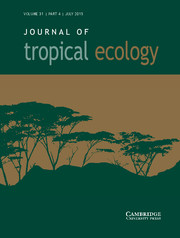Crossref Citations
This article has been cited by the following publications. This list is generated based on data provided by
Crossref.
Mansor, Marzalina
Nadarajan, Jayanthi
and
Cheng, Ang Khoon
2003.
Pasoh.
p.
215.
Nakagawa, M.
Itioka, T.
Momose, K.
Yumoto, T.
Komai, F.
Morimoto, K.
Jordal, B.H.
Kato, M.
Kaliang, H.
Hamid, A.A.
Inoue, T.
and
Nakashizuka, T.
2003.
Resource use of insect seed predators during general flowering and seeding events in a Bornean dipterocarp rain forest.
Bulletin of Entomological Research,
Vol. 93,
Issue. 5,
p.
455.
Numata, Shinya
Yasuda, Masatoshi
Okuda, Toshinori
Kachi, Naoki
and
Noor, Nur Supandi Md.
2003.
Temporal and spatial patterns of mass flowerings on the Malay Peninsula.
American Journal of Botany,
Vol. 90,
Issue. 7,
p.
1025.
Nakagawa, Michiko
and
Nakashizuka, Tohru
2004.
Relationships between physical and chemical characteristics of dipterocarp seeds.
Seed Science Research,
Vol. 14,
Issue. 4,
p.
363.
Maycock, Colin R.
Thewlis, Richard N.
Ghazoul, Jaboury
Nilus, Reuben
and
Burslem, David F.R.P.
2005.
Reproduction of dipterocarps during low intensity masting events in a Bornean rain forest.
Journal of Vegetation Science,
Vol. 16,
Issue. 6,
p.
635.
Maycock, Colin R.
Thewlis, Richard N.
Ghazoul, Jaboury
Nilus, Reuben
and
Burslem, David F.R.P.
2005.
Reproduction of dipterocarps during low intensity masting events in a Bornean rain forest.
Journal of Vegetation Science,
Vol. 16,
Issue. 6,
p.
635.
Nakagawa, Michiko
Takeuchi, Yayoi
Kenta, Tanaka
and
Nakashizuka, Tohru
2005.
Predispersal Seed Predation by Insects vs. Vertebrates in Six Dipterocarp Species in Sarawak, Malaysia1.
Biotropica,
Vol. 37,
Issue. 3,
p.
389.
BREARLEY, FRANCIS Q.
PROCTOR, JOHN
SURIANTATA
NAGY, LASZLO
DALRYMPLE, GEMMA
and
VOYSEY, BENEDICT C.
2007.
Reproductive phenology over a 10‐year period in a lowland evergreen rain forest of central Borneo.
Journal of Ecology,
Vol. 95,
Issue. 4,
p.
828.
Hosaka, Tetsuro
Yumoto, Takakazu
Kojima, Hiroaki
Komai, Furumi
and
Noor, Nur Supardi Md.
2009.
Community structure of pre-dispersal seed predatory insects on elevenShorea(Dipterocarpaceae) species.
Journal of Tropical Ecology,
Vol. 25,
Issue. 6,
p.
625.
FUJITA, Mariko
MATSUI, Kiyoshi
TERAKAWA, Mari
KOMAI, Furumi
YUMOTO, Takakazu
and
MAETO, Kaoru
2009.
Pre‐dispersal seed predation of bayberry Myrica rubra by Thiotricha pancratiastis (Lepidoptera: Gelechiidae) on Yakushima Island, Japan.
Entomological Science,
Vol. 12,
Issue. 4,
p.
427.
Visser, Marco D.
Jongejans, Eelke
van Breugel, Michiel
Zuidema, Pieter A.
Chen, Yu-Yun
Rahman Kassim, Abdul
and
de Kroon, Hans
2011.
Strict mast fruiting for a tropical dipterocarp tree: a demographic cost-benefit analysis of delayed reproduction and seed predation.
Journal of Ecology,
Vol. 99,
Issue. 4,
p.
1033.
Numata, Shinya
Suzuki, Ryo O.
Nishimura, Sen
Naito, Yoko
Konuma, Akihiro
Tsumura, Yoshihiko
Tani, Naoki
Okuda, Toshinori
and
Nur Supardi, Md Noor
2012.
Fruiting behavior of dipterocarps in two consecutive episodes of general flowering in a Malaysian lowland rain forest.
Journal of Forest Research,
Vol. 17,
Issue. 4,
p.
378.
Satake, Akiko
Leong Yao, Tze
Kosugi, Yoshiko
and
Chen, Yu‐Yun
2021.
Testing the environmental prediction hypothesis for community‐wide mass flowering in South‐East Asia.
Biotropica,
Vol. 53,
Issue. 2,
p.
608.
Igarashi, Shuichi
Yoshida, Shohei
Kenzo, Tanaka
Sakai, Shoko
Nagamasu, Hidetoshi
Hyodo, Fujio
Tayasu, Ichiro
Mohamad, Mohizah
and
Ichie, Tomoaki
2024.
No evidence of carbon storage usage for seed production in 18 dipterocarp masting species in a tropical rain forest.
Oecologia,
Vol. 204,
Issue. 3,
p.
717.




